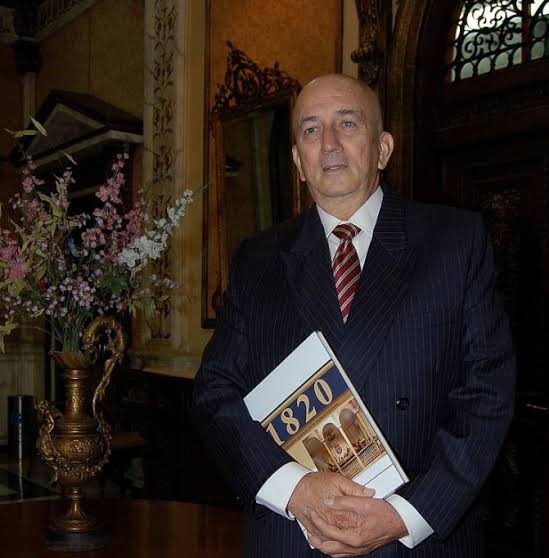Efrén Avilés Pino (Guayaquil, February 26, 1947 – Ibidem, December 31, 2009) was a renowned Ecuadorian historian, writer, and university professor. Educated at the University of Guayaquil, he significantly contributed to Ecuador’s historical research, emphasizing the Province of Guayaquil’s role in national independence. His acclaimed works include the “Enciclopedia del Ecuador” and “Historia del Ecuador.” Also notable in the music industry, Avilés composed the anthem for Club Sport Emelec. A member of the National Academy of History, he resigned amid controversies over historical perspectives. Honored with the Merit of Commandeur in 2002, his legacy in Ecuadorian history and culture is enduring.
Early Life and Education
Efrén Avilés Pino, born on February 26, 1947, in Guayaquil, Ecuador, embarked on his intellectual journey in his hometown. He was educated at the prestigious University of Guayaquil, where he laid the foundation for a career that would span various fields. Avilés Pino’s early life in the culturally rich environment of Guayaquil played a significant role in shaping his diverse interests and profound understanding of Ecuadorian culture and history.
Career
Writing
Avilés Pino distinguished himself as a prominent writer and historian. His works, notably the “Enciclopedia del Ecuador Histórica, Geográfica y Biográfica” (1998) and “Historia del Ecuador” (2000), reflect his deep dive into the realms of history, geography, and biography. His writing was not just informative but also provocative, often igniting scholarly debate.
Music
In the world of music, Avilés Pino made his mark as an executive producer at Ifesa. Here, he worked with legendary artists like Julio Jaramillo and Jinsop, contributing significantly to Ecuador’s musical heritage. His lyrical prowess was exemplified in the anthem he composed for Club Sport Emelec, blending his passion for music with his love for football.
Academia
Avilés Pino’s academic career was equally illustrious. As a university professor, he influenced many students with his insightful lectures and discussions. His tenure in the National Academy of History of Ecuador, though marred by controversy, underscored his commitment to historical discourse and research.
Writing
Avilés Pino’s writing was a blend of meticulous research and passionate storytelling. His books and articles often focused on lesser-known aspects of Ecuadorian history, shedding light on pivotal moments and figures. His style was engaging yet scholarly, making history accessible to a broader audience. His contributions to historical writing have been invaluable in shaping the understanding of Ecuador’s past.
Controversy
Avilés Pino’s tenure at the National Academy of History was marked by significant controversy. His strong opinions, particularly regarding the historical role of Guayaquil in Ecuador’s independence, sparked debates and accusations of promoting regional separatism. His resignation from the Academy followed heated disagreements with other historians, highlighting the polarizing nature of his views on Ecuador’s historical narrative. This controversy underscored the challenges inherent in historical interpretation and the passion Avilés Pino brought to his work.
Legacy
Efrén Avilés Pino’s legacy extends far beyond his demise on December 31, 2009, after a valiant battle with multiple myeloma. As a historian, writer, and cultural influencer, he left an indelible mark on Ecuador’s historical consciousness. His extensive works, particularly in the realms of historical and geographical research, continue to shape the understanding of Ecuador’s past and present. Avilés Pino was not just a chronicler of history; he was a part of it, influencing discussions and perspectives with his bold views, especially on the role of Guayaquil in Ecuador’s independence. In music and academia, his contributions remain a testament to his diverse talents and profound impact on Ecuadorian culture. His passing was a significant loss to the intellectual community, but his legacy endures, inspiring future generations to explore and appreciate the rich tapestry of Ecuadorian history and culture.
Works
- Himno del Club Sport Emelec (1991)
- Diccionario del Ecuador Histórico, Geográfico y Biográfico (1994)
- Atlas Ecuador Panorámico (1994)
- 500 años de historia (1995)
- Gobernantes del Ecuador (1996)
- Calendario histórico del Ecuador (1997)
- Enciclopedia del Ecuador Histórica, Geográfica y Biográfica (1998)
- Guayaquil 2000: Una ciudad para el próximo milenio (1999)
- Historia del Ecuador (2000)
- Carlos Arroyo del Río: Mártir o traidor (2004)
- El Libro de Guayaquil (2006)
- 1820: La verdadera historia de la Independencia (2008)
- Monumentos, Plazas y Parques (2009)
- Los Planos de Guayaquil -Primera obra post mortem, en coautoría con Melvin Hoyos Galarza- (2010)

